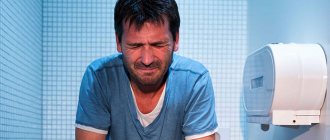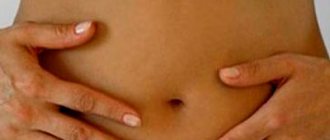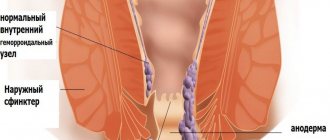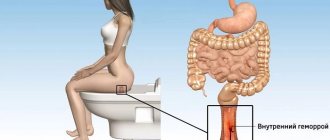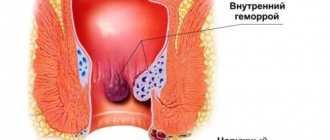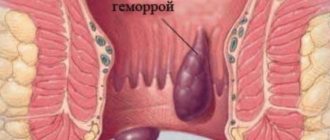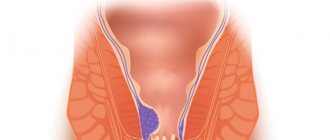Hemorrhoids have become a common problem. Associated with leading a sedentary lifestyle and poor nutrition. The disease has characteristic symptoms. Affects the rectum, anus area. Patients hope that hemorrhoids will go away on their own. Whether hemorrhoids can go away without treatment depends on the stage of the disease and the patient’s lifestyle.
The hope for spontaneous treatment of external hemorrhoids is not justified. Recovery occurs in the early stages of the disease. Spontaneous healing does not guarantee protection against exacerbation of hemorrhoids. In the future, relapses of the disease are likely. If hemorrhoids go away on their own, remember the risks of relapse and follow preventive measures.
Why does hemorrhoids develop?
To understand whether hemorrhoids go away on their own without treatment, you need to understand the reasons for their occurrence.
Every person has hemorrhoids; they are cavernous formations that appear in the lower part of the rectum during embryonic development. When various negative factors act on this area of the intestine, the veins and vessels in these “bags” expand, losing their elasticity. Against the background of weak tone, blood circulation is disrupted and stagnation begins.
In the first stages of hemorrhoid development, dysfunction of the intestinal circulatory system does not particularly manifest itself. As the disease worsens, hemorrhoids begin to fill with blood, causing them to increase in size. As the pathological process progresses, the tissue around the damaged area begins to change, which is manifested by inflammation of the rectal mucosa. Under the influence of all that has been said, the overcrowded cavernous “sacs” become too heavy and move downwards – prolapse of hemorrhoids.
Whether hemorrhoids can go away on their own without treatment depends on the underlying cause of its development and neglect. The following factors can provoke varicose veins in the rectum:
Recipes, menus and diet products
- frequent constipation;
- Difficulty defecating, accompanied by straining;
- stagnant processes in the rectum due to low physical activity;
- errors in nutrition (infatuation with fatty, smoked, spicy and other foods that negatively affect the intestines);
- alcohol abuse;
- frequent stress;
- physical activity (weight lifting).
Recipes, menus and diet products
This disease often develops in women when carrying a child, especially in the 2nd and 3rd trimester, when the enlarged uterus puts pressure on the intestinal walls. Hemorrhoids also often appear after natural delivery. In addition, hereditary predisposition plays a major role in the formation of varicose veins.
Hemorrhoids after childbirth
About 60% of patients suffering from hemorrhoids are women after childbirth. The disease develops during pregnancy due to the pressure of the growing uterus on the choroid plexuses, which are located in the pelvic area. An aggravation of the situation occurs directly during childbirth, when the pressure on the pelvic floor increases many times over.
It is also difficult to say whether hemorrhoids go away on their own after childbirth. In 70% of women, it disappears on its own after 2-4 weeks without the use of drug therapy. Unfortunately, in the remaining 30% of women, hemorrhoids become chronic and do not disappear without surgical intervention.
In what cases can hemorrhoids go away on their own?
Whether hemorrhoids can go away on their own depends on its phase of development. In practice, this occurs exclusively at the first stage.
You should contact a proctologist if the following symptoms occur:
- itching in the anal area;
- burning after bowel movement;
- a feeling of discomfort in the rectum (as if there is something there);
- the presence of drops of blood on paper or stool.
At the very beginning of the disease, all the mentioned signs are distinguished by their inconstancy. Typically, inconvenience and discomfort in the anorectal area are provoked by certain factors, for example, intense physical training, heavy lifting, or difficulty defecating.
Pathological changes in the cavernous “pockets” at the early stage of hemorrhoids are reversible. At the same time, early diagnosis and how responsibly the patient will follow the doctor’s recommendations and instructions decide a lot.
Conservative treatment of the disease
You should not hope that hemorrhoids will go away on their own. At the first and second stages of development, only conservative treatment will be required. There are two approaches.
- General treatment.
- Local therapy.
By general treatment we mean carrying out preventive measures. Patients take systemic phlebotropes - Venorutan, Detralex, and other analogues.
Local treatment involves the use of drugs that eliminate itching, burning, pain, and help counteract inflammatory processes, swelling and local hyperemia. Patients will be able to carry out health procedures at home.
For local therapy, the following popular drugs are prescribed: Hepatrombin G, Posterisan, Aurobin, Nefluan. Levomekol or Mafinid will help speed up healing and eliminate pathogenic microflora. Adroxon or Tachycomb can stop the bleeding.
Preventive measures
Having suspected the presence of hemorrhoids, the patient must immediately take measures to prevent the further development of the pathological process. To do this, at the first symptoms that appear, you need to follow these rules:
- Radically review your diet. It should be adjusted so that there are no problems with bowel movements, especially constipation. It is important to exclude fatty, fried and smoked foods from your diet, as well as reduce your consumption of flour products. It is not recommended to eat foods that increase gas formation and strengthen the intestines. The emphasis should be on plant dietary fiber, which is abundant in vegetables and fruits.
- Avoid a sedentary lifestyle. Physical inactivity is a common cause of constipation and hemorrhoids. When a person remains in one position for a long time, his blood circulation slows down. With prolonged sitting, blood circulation in the pelvic region worsens, and congestion begins in the vessels of the rectum, which causes pathological processes in them. Moderate physical activity, such as swimming, walking or light jogging, can help avoid such problems.
- Monitor your drinking regime. Adequate fluid intake prevents the development of many problems. So, by drinking enough water per day, you can avoid stagnation of blood in the vessels and veins, and also prevent the appearance of constipation, which is especially undesirable in case of hemorrhoids.
Can external hemorrhoids go away on their own and what is needed for this? Protrusion of hemorrhoids beyond the rectum indicates the transition of the disease to the second stage. In this case, preventive measures will only slow down the further development of the pathology, eliminating the symptoms, but will not cure it completely.
Radical treatment measures
Radical surgical treatment is necessary for patients with complex forms of hemorrhoids of the third and fourth stages. At this stage, malignancy, total inflammation, infection, and pinched cones may occur. It is necessary to eliminate all damaged tissue, and conservative methods are out of the question.
Time has been lost, so you need to use the heaviest arsenal to influence the problem. With sufficient equipment, treatment regimens and actual experience, a competent surgeon can perform the following surgical treatment options:
- Longo operation;
- TGD (transanal hemorrhoidal disarterialization);
- Classic hemorrhoidectomy and its various modifications.
Can hemorrhoids at an advanced stage go away on their own?
Do hemorrhoids go away on their own in the later stages of development? In its advanced form, accompanied by the formation of nodes in the rectum and around the anus, the disease can be cured exclusively with medication. As soon as the hemorrhoidal vessels expand, their stretched walls can no longer return to their previous size on their own.
The longer you postpone a visit to the doctor, the more acute the illness will manifest itself, since changes in the cavernous veins and nearby vessels will occur constantly. You should not delay visiting a specialist if the following signs appear:
- frequent or constant burning in the rectum and near the anus;
- itching and pain, intensifying after bowel movement;
- presence of blood after defecation;
- bleeding due to ruptures of hemorrhoidal formations.
In the absence of proper treatment, the disease quickly progresses to severe stages, which are characterized by complications such as thrombosis of hemorrhoidal veins, prolapse and pinching of cones, as well as weakening of the sphincter. Advanced hemorrhoids are often accompanied by spontaneous release of feces, anemia and necrosis of damaged tissues of the rectum and anus.
Why does the disease not go away in later stages?
At advanced stages of the disease, enlarged venous nodes – hemorrhoidal cones – form around the rectum. The formations are constantly filled with venous blood, under its pressure the walls of the veins expand, the size of the nodes increases. The condition of the nodes does not allow returning to the original dimensions. In dilated nodes, blood circulates with difficulty, which leads to stagnation and the formation of blood clots.
Gradually enlarged hemorrhoids come out. If the disease is in the compensation stage, the cones are pulled inward with the help of the pelvic floor muscles. In the stage of decompensation, the patient has to push the lumps into the anus with his hands. Gradually, the disease progresses, the bumps remain outside constantly - causing pain and discomfort to the patient. Clinical symptoms in advanced stages cannot disappear without medical intervention.
In the anus area the patient feels severe itching and burning. Gradually, blood clots begin to form in the node, which poses a threat to the life and health of the patient. Rupture of the hemorrhoid leads to the development of bleeding and the formation of perirectal fistulas.
Timely and competent treatment under the supervision of a proctologist will lead to the expected improvement in the patient’s health status and prevent the development of relapses. Whether the disease goes away or progresses further will depend on the regular and accurate implementation of the doctor’s prescriptions.
Clinical picture of hemorrhoids
Hemorrhoids, like any other pathology, go through several stages of development. At the very first stage, the destruction processes can be stopped and partially damaged tissues can be restored. However, due to the fact that there are no symptoms at all, patients do not even suspect what processes have begun to occur in the body. Accordingly, no therapeutic measures are taken.
Without treatment, the disease will only progress. At a certain stage, the following symptoms occur:
- the hemorrhoid falls out of the anus when straining (in the later stages the lump remains outside);
- severe pain syndrome;
- itching;
- burning;
- perianal edema (sometimes it can disappear for a while and patients think that the disease was able to go away on its own, but this is a mistaken opinion);
- the nodes bleed (permanently or temporarily);
- mucus may come out of the anal canal;
- discomfort, there is a feeling of unpleasant fullness of the anus.
However, the danger is steadily progressive if it is not treated promptly. Moreover, inflamed nodes can succumb to necrosis, thrombosis, and damaged tissues can become malignant over time (degenerate into cancerous pathology).
Causes
The development of hemorrhoids is influenced by the following factors:
- heredity;
- physical inactivity;
- pregnancy and childbirth;
- obesity;
- excessive physical activity;
- prolonged constipation or diarrhea;
- alcohol consumption;
- smoking;
- poor nutrition;
- non-compliance with drinking regime.
Physical inactivity can lead to hemorrhoids
Relationship between symptoms and stages of disease development
Manifestations of hemorrhoids depend on the stage of development of the disease. And the answer to the question whether hemorrhoids go away on their own depends on at what stage of the disease it arose.
At the first stage of the disease, a slight expansion of the veins occurs with the formation of nodes. The bumps are not yet felt or palpated, as they are located quite deep. But upon visual examination, the doctor will see an increase in the vascular pattern on the mucous membranes of the rectum. As a rule, the patient does not experience any particular discomfort.
The second stage is characterized by periodic prolapse of hemorrhoids. This happens under conditions of increased intra-abdominal pressure, that is, when lifting weights, straining with constipation, etc. During this period, at rest, as well as after a night's sleep, the nodes can still be adjusted independently.
At the third stage, external lumps appear, which the patient can still straighten on his own. In this case, hemorrhoids appear even at normal intra-abdominal pressure. The location of the cones usually corresponds to 3, 7 and 11 o'clock on the symbolic dial. This period is also characterized by the addition of such a dangerous phenomenon as thrombus formation, as well as pinching and inflammation of the nodes.
The fourth stage is the most severe and advanced. Intense pain limits movement. Hemorrhoids cannot be reduced and are always on the outside. Bleeding from the rectum is almost constant. The course of the fourth stage is complicated by the possibility of developing anemia, necrosis of the hemorrhoid, etc.
The course of hemorrhoids and the risk of its occurrence are influenced by hereditary predisposition and external, acquired factors. And if the formation of venous walls during embryogenesis cannot be influenced, then the influence of damaging factors should be tried to be limited.
Possible causes of hemorrhoids:
- Difficulty in defecation, which results in increased trauma to the enlarged venous plexuses;
- Frequent intake of fatty, salty and spicy foods, as they increase blood supply to the pelvic organs;
- Decreased physical activity;
- Alcohol abuse;
- Unbearable physical activity.
Also at increased risk are women in labor and expectant mothers. Every second woman during this delicate period is faced with hemorrhoids and its further consequences.
Initial stages of the disease
In the initial stage of the disease, the patient may not feel subjective discomfort. Internal hemorrhoids are small in size and considered invisible. External nodes do not increase.
Then complaints of itching and burning appear. Mucus begins to secrete from the anus. Bloody discharge appears. The patient may not pay attention to the signs that appear, not attaching any importance. Changes in the state of the body are caused by stagnation of blood in the pelvis, weakness of the venous valves, and increased pressure in the pelvic cavity.
Predisposing factors for the development of the disease:
- Sedentary lifestyle. Mostly sedentary work, long periods of time standing on your feet.
- Lifting and moving loads of significant weight.
- Hard physical labor.
- Playing big sports.
- Violations of diet and eating habits, leading to the development of constipation.
Can hemorrhoids go away?
In the early stages of the disease, the enlargement of hemorrhoids and their prolapse occurs under the influence of the provoking circumstances listed above. If the factors are eliminated, the clinical manifestations quickly disappear, hemorrhoids go away.
If you do not adhere to medical recommendations regarding the nature of your diet and physical activity, eliminating hemorrhoids on your own without treatment will become impossible. It will progress and go into a difficult stage. External hemorrhoids are difficult to eliminate and require medication. Often the doctor is forced to recommend surgical intervention to the patient to eliminate prolapsed, bleeding nodes - other methods of combating the disease do not bring results.
Spontaneous cure
The inflammatory process in combination with damage to the vascular wall of the anal area extremely rarely goes away without outside help. Microscopic cracks form on the mucosa, which easily become inflamed due to the attachment of pathogenic microflora.
Before contacting a proctologist, it is permissible to take a number of measures to alleviate the course of the disease. They turn out to be enough for hemorrhoids to go away and not bother the patient for a long time.
Preventing constipation
To ensure that the stool forms normally and does not create discomfort, follow a special diet. In your diet, use more foods enriched with plant fiber - cereals, fruits, vegetables.
Fried, spicy foods, pickles, and marinades are excluded. It is recommended to drink at least one and a half liters of liquid per day. The measures will eliminate the development of hemorrhoids in the early stages and facilitate healing in the later stages.
Stimulation of motor activity
To prevent stagnation in the pelvis, it is recommended to lead an active lifestyle and get involved in feasible sports. Weightlifting and other strength sports can worsen the condition. It is worth giving preference to gentle loads.
It is not recommended to spend long periods of time sitting. From time to time you need to get up and do light exercises. You can just walk around. In order for hemorrhoids to disappear in the early stages, it is recommended to perform special complexes of therapeutic exercises to strengthen the pelvic floor muscles and improve blood flow in the pelvis.
It is strictly forbidden to lift or move excessively heavy loads. Greater physical activity increases pressure in the pelvic cavity and increases the size of hemorrhoids.
Maintaining hygiene rules
It is important to remember the rules of hygiene so that the early symptoms of hemorrhoids go away spontaneously. It is necessary to thoroughly wash the anus area with running water after visiting the toilet. It will help avoid secondary infection, the development of inflammation, and tones the blood vessels. Washing with cool water is a proven method of preventing knots from falling out.
If the disease continues to progress during the measures taken, you need to seek help from a proctologist - resort to medical measures to influence the disease.
